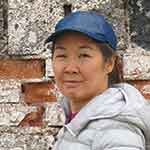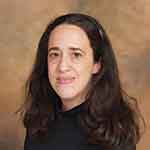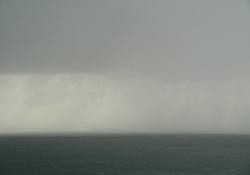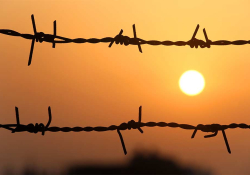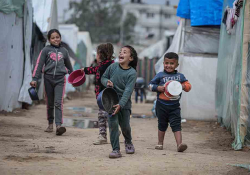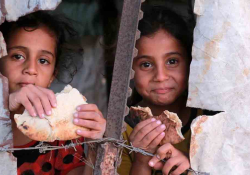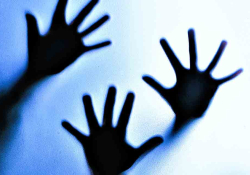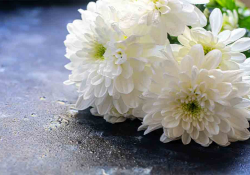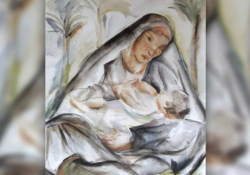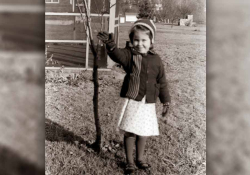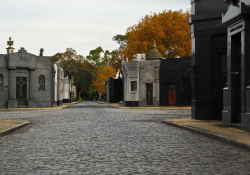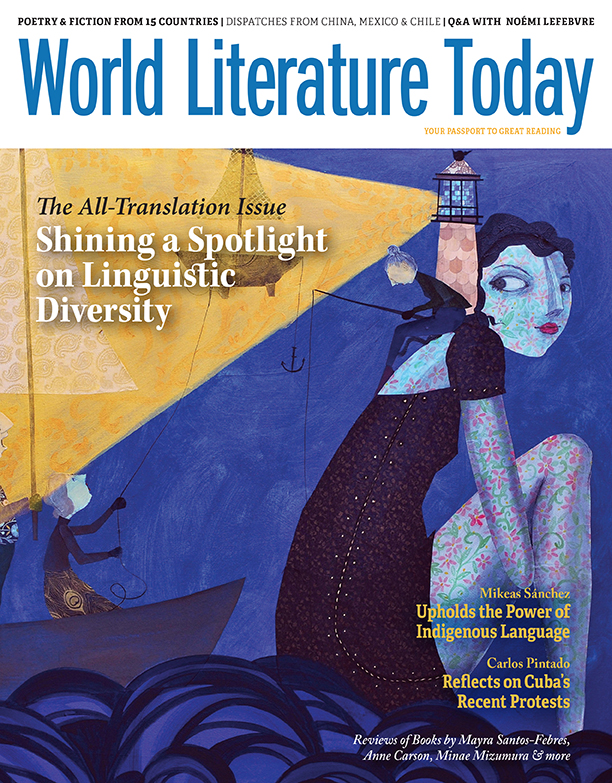My Eleusinian Mysteries
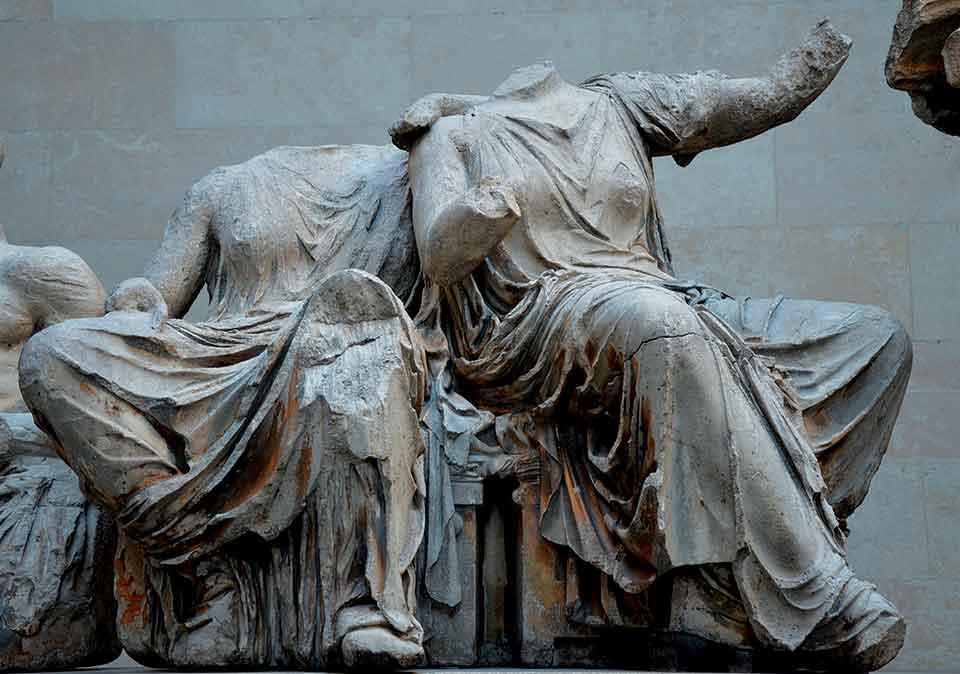
A car racing down an empty steppe highway frames this essay from Kazakhstan today, as a mother ponders how ancient mythology informs her place in her own matrilineal heritage.
The trail of light formed by the headlamps of cars racing across the steppe highway dwindled to nothing in the darkness. That light was powerless to illuminate the darkness around us, but nevertheless, there it was. I felt it was not just lighting our journey. The very road in front of the car seemed to appear out of nothing under the rays of light, and then dissolve, disappear into the darkness behind us. My little girl was sleeping on my lap, my traveling companions were sleeping, too, and the driver wasn’t talking, so I was alone in the night. I felt as if I were the only one experiencing, with every cell of my body, our miraculous flight through the darkness. I alone could recognize this darkness as a wordless, eternal threat to the life flickering warm inside the car. My daughter felt heavy by now, her little body warming my stomach, and somewhere deep inside me—much lower than my heart—I was melting, softening, being somehow carried back to the time that this little nubbin, just tiny then, breathed and moved there inside me. . . . And just as a woman’s womb encloses and protects her unborn child, I felt now that my whole body and the circle of my arms were protecting my small daughter from the darkness, behind us and all around us, and only the weak rays of light ahead of us remained open for her. Suddenly I thought about my own mother, now dead, and my mother’s mother, and her mother, and the thousands of generations of my great-grandmothers on my mother’s side, about their lives, giving birth to their children and feeding them, in a yurt blanketed with snow among the frozen and threatening steppe, or on the road during a migration, and often, too often during wartime, while waiting for their husbands to return, never knowing whether they were still alive, whether they’d be used as living shields to repel the enemy, whether raiders would appear that night in the defenseless aul. They gave birth, and regardless of what forward-thinking modern people might say, it wasn’t any animal instinct to reproduce, because there are situations in which even animals do not multiply, saving their strength instead for self-preservation. And if even one of those thousands of links in the chain of my great-grandmothers had lost the love of life, the faith in life, which women need to bring defenseless human beings into this world, then I would never have existed, and neither would my little daughter. . . .
I felt as if I were the only one experiencing, with every cell of my body, our miraculous flight through the darkness.
Our lives are like the light from headlights, so bright at the source, dwindling so quickly in the unyielding darkness. One brightly lit slice is our present. A slice of weakening light is our future, for which we make plans that make Someone laugh. And we are never allowed to know what lies beyond the boundary between light and dark. We can only assume, hope, that past that point, our path will continue. And we have only our love and faith to guard our children from the darkness that gobbles up the past and threatens the future.
My daughter lost her azhe, her maternal grandmother, when she was nine months old, and lost her paternal grandmother twenty years before she was born. But even before she turned two, she would sometimes laugh heartily in her sleep, then wake up, look around, and ask, “Where’s Grandma? Where did she go?” Out on our walks, she peered intently into the faces of old Kazakh women, and she toddled around the ones that sat on benches outside, bringing them presents, putting little leaves and pebbles into their wrinkled hands. And one time she looked at a group photo in an album I had left open and recognized her immediately: “Look! My grandma!” And in the next photo, she saw her again. It wasn’t her memories from babyhood at work, because it was her father’s mother she had recognized, not mine. And I thought, perhaps that meant her paternal grandmother’s spirit had come to my child in her sleep, to play with her twentieth or twenty-fifth granddaughter. . . . But my mother’s spirit hadn’t shown up to see her first, immensely beloved granddaughter, and I struggled to understand why.
Later, when my daughter was a little bigger, she started to wonder why other children had two grandmothers, often even great-grandmothers, and she didn’t even have one. She asked me: “If I don’t have a grandma, that means my kids won’t have a grandma. Right?” And I vowed to my four-year-old daughter that her children would have a grandmother, certainly they would, and a lively one at that. Anytime I remember about living a healthy lifestyle, or getting some exercise, that vow I made is the reason.
An old bit of folk wisdom says that as long as a person has a mother, she remains a child. But I don’t think this is about infantilism. When my mother died, I was out on a walk with my baby daughter. I carried her into the house and someone told me the bad news, but from my chronic lack of sleep or for some other reason, the information did not really get through to me. “All right, I’ll bring the stroller in and start clearing out the spare bedroom for guests. And I’ll need to clear a room for the body,” I said. By then I knew all too well what death and funeral rituals meant. Several hours later, when I had begun feeling terrible, my closest friend called from Paris and asked what was wrong. Even then I answered her calmly. “Oh, I’m fine. My mother died.” With the men I drove to the cemetery and went through all the formalities. With the women I cooked and baked everything we needed for the meal at the wake. All night I sat next to the cold body, I did something like grieving and crying, but . . . But I only genuinely understood what had happened when I was standing at the edge of her open grave, holding a clump of clay soil dug from the pit, when my mother’s body, wrapped in a white shroud, was lowered into the grave and people began dropping that soil onto her.
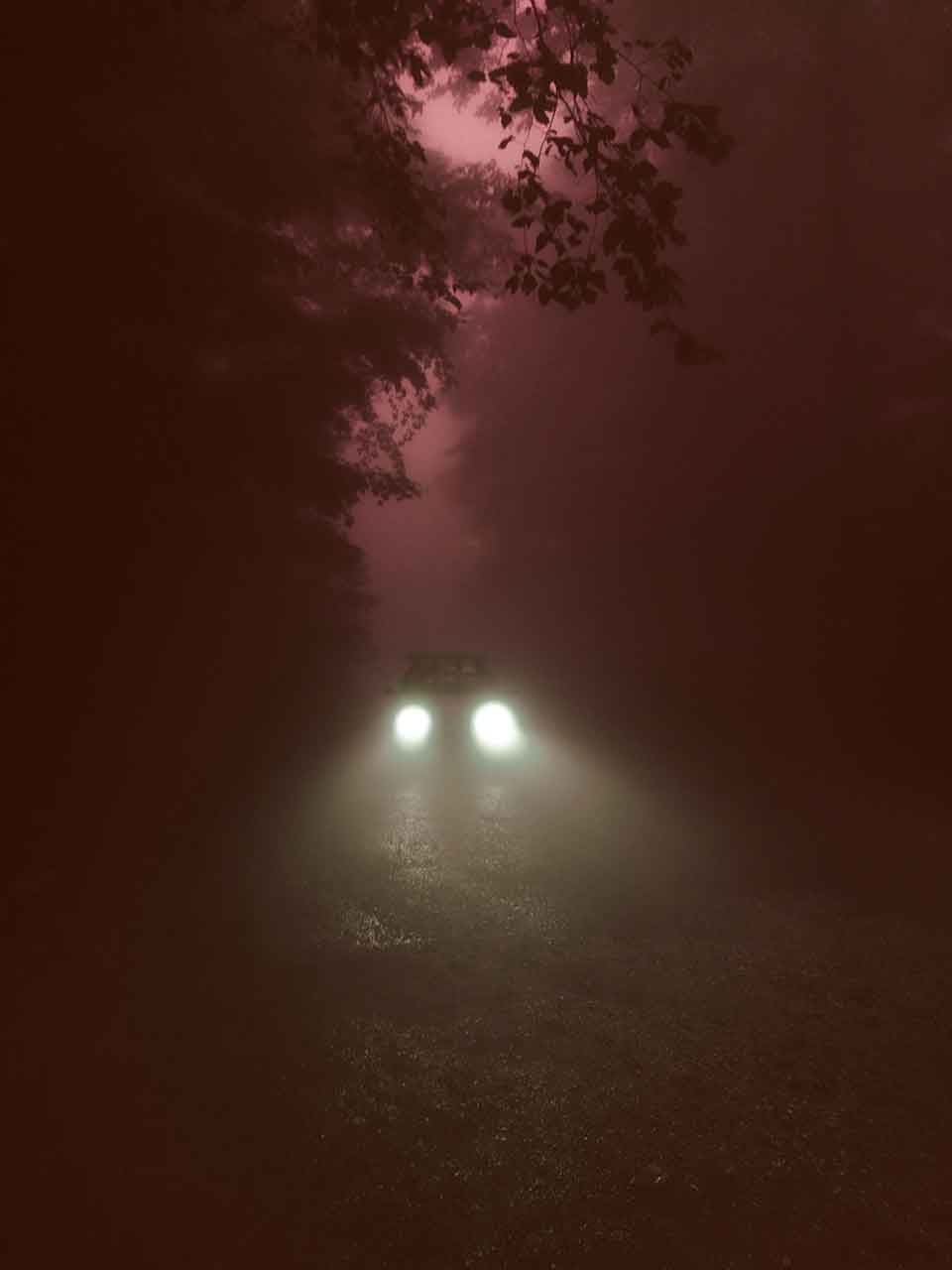
I thought about how my daughter would take the cup of life from me, the one our grandmothers had carried through the darkness of millennia, through war and hunger, through victory and defeat.
I finally comprehended my loss, and I wept with grief, but even then I did not understand that from then on my fate, as the oldest woman in the family line, would be to stand there, on the edge of that grave. I was now first in line to follow her, to walk away into the darkness. I can only pray to God that that order be preserved, so that nobody takes away my sacred right to go next. A woman does not only bring a child into the world. A mother must stand between that child and the darkness, as long as she can, sheltering her from the sight of the gaping jaws of oblivion. Perhaps women are forbidden, in Islam, from participating in funerals because life and death are not supposed to go together in their minds, so that death does not desecrate or sap that feminine power we need for birth. But us, we’ve been raised differently by other mothers and grandmothers. When she buried her forty-three-year-old son, my paternal grandmother climbed down into the grave herself to arrange his head more comfortably where he lay. I think there was no desecration on earth, physical or moral, that could have sullied my azhe, her overworked brown hands, her brave motherly heart.
In ancient Greece, the Eleusinian mysteries were endowed with the highest honors and accompanied by the most secret rites. Every poet and philosopher in the Iliad sings their praises: death cannot touch anyone blessed by the Eleusinians, and no man can be happy who has not undergone those ceremonies or glimpsed their secret wisdom. “Happy is he who has been received! The uninitiated will know not fortune, and be destined to remain in the sorrowful gloom,” they say.
Experts believe that at the heart of the Eleusinian mysteries were dramatic performances telling the story of two goddesses, a mother and daughter, Demeter and Persephone. Persephone was abducted by the god of the underworld, and her goddess mother grieved, causing all of nature to stop flowering and bearing fruit. Then her daughter returned for a time and Demeter and the gods reconciled. That myth explains the natural cycle of death and rebirth: when Persephone returns to Demeter from the underworld kingdom, the mother rejoices and spring comes; when Persephone returns to her husband in the world of the dead, Demeter puts on her mourning clothes again, and nature dies. As they watched these performances, the people who participated in the rites, including men, made their own journey into the darkness, came face-to-face with the god of the dead underworld, and contemplated the new shoot that grows thanks to the death of the grain buried in the earth. They were supposed to experience the cyclical nature of life and death, the eternity and persistence of life, handed down from mother to daughter, from woman to woman. This truth, expressed in words, seems banal, probably because the Eleusinian mysteries really were shrouded in mystery. But recognizing this banality during the multiday ceremonies of cleansing and trials was a source of peace and wisdom for perishable human beings.
My own Eleusinian mysteries lasted for nine years. I set off on my path into the darkness when my azhe left us. My grief was ferocious. I could not understand why this woman in particular, who had marveled in life, whose Light had softened even the most hardened souls, had gone away, and why so many contemptible people went on living. I wanted to scream loud enough to tear the moon from the sky, to make this whole indifferent world shatter and sink into hell. I kept my head lowered when I walked so I wouldn’t see the hateful, thoughtless faces of passersby, so I wouldn’t frighten them with my own gaze, and also because I couldn’t tear my eyes away from the earth that had taken in my azhe. A year or two years passed. It must have been my one-hundredth solitary bus ride to the cemetery in Kensay. At one bus stop, a little removed from the crowd, there stood two members of that most unpleasant class of old women, the ones with the sharpest elbows and shrillest voices, the kind who would shove someone else’s child out of line when waiting for the cheapest scraps of meat. And suddenly, through the dirty window, I could see them clearly, in bold relief. I realized that these old women were dying, as were we all, and that they knew all about their imminent deaths and were afraid of them, the way my azhe had never been afraid. I felt sorry for them. They were my sisters in death. . . .
In the car racing across the nighttime steppe, I thought about how my daughter would take the cup of life from me, the one our grandmothers had carried through the darkness of millennia, through war and hunger, through victory and defeat. And I also felt that we were not alone in the night, that our foremothers were there, invisible, protecting us. “Keep this daughter of mine safe from the evil eye, from illness and pain, from trouble and strife,” I remember my azhe praying in Kazakh as she combed my hair. And I whispered those words now, as I embraced my sleeping daughter.
Almaty, Kazakhstan
Translation from the Russian
Editorial note: This essay will be featured in Amanat: Recent Women’s Writing from Kazakhstan, forthcoming from Gaudy Boy in July 2022.
